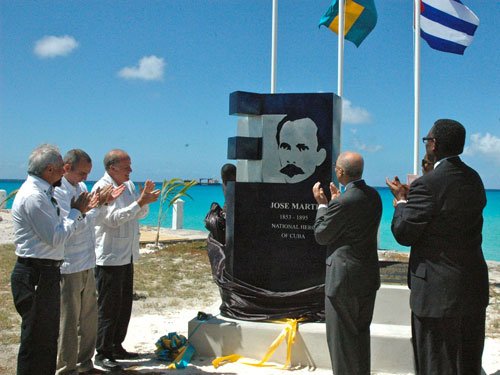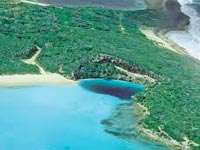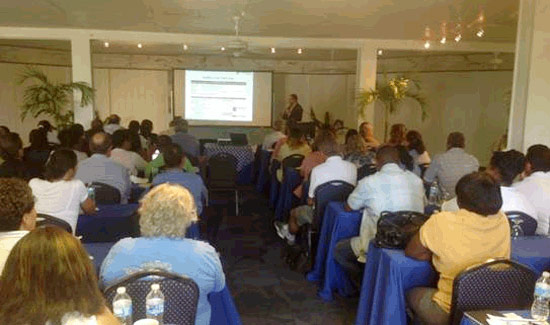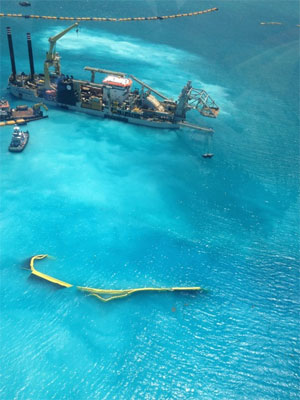 During the unveiling of the Jose Marti Monument in Mathew Town, Inagua February 23, Governor General Sir Arthur Foulkes spoke of the sin of inequity that comes from the struggle for survival. He said vanity not only divides people, but opens an equal opportunity to take advantage of each others weaknesses.
During the unveiling of the Jose Marti Monument in Mathew Town, Inagua February 23, Governor General Sir Arthur Foulkes spoke of the sin of inequity that comes from the struggle for survival. He said vanity not only divides people, but opens an equal opportunity to take advantage of each others weaknesses.
Also taking part in the unveiling to commemorate Jose Marti’s stop at Inagua on April 11, 1895 was Ernesto Soberon Guzman, Ambassador of the Republic of Cuba to The Bahamas.
“Our tribute to Jose Marti comes at a time when the people who share this common habitat of Planet Earth are facing an array of challenges to world equilibrium, amity and comity; and threats to their peace, their security and — it is unfortunately not an exaggeration to say — even their survival,” said Sir Arthur.
“Listen to Jose Marti again: ‘Men have no special rights because they belong to one race or another. When you say men, you have already imbued them with all their rights. … Anything that divides men from each other, that separates them, singles them out, or hems them in, is a sin against humanity’.”
Sir Arthur read the words of Marti, who was the great Cuban liberator, poet, philosopher and journalist. Marti lived in exile in Santo Domingo in March 1895 and wrote the Montecristi Manifesto to justify the final Cuban War of Independence from Spain. He believed that original sin is using one’s human features and character to oppress and abuse, as well as divide and conquer.
” ‘If that is true, then great is the original sin of those who use religion, gender, race or ethnicity to divide humankind; great is the sin of those who use narrow national interests to single out and oppress others; and greater yet is the sin of those who use division and strife to facilitate their abuse of the planet and the pillage of our common natural heritage’,” said Sir Arthur.
” ‘For too many generations the progress of humankind has been hampered by powerful forces using the doctrine of divide and rule, divide and oppress, divide and exploit’.”
In April 1895, Marti left Santo Domingo and took five others with him to go back to the Cuban revolution that had already started. The group of revolutionaries stopped at Inagua and were searched by British officials, but were released. Marti bought a dinghy for 100 pesos and persuaded Captain Heinrich Lowe, who was the captain of a German ship at Inagua, to deliver the revolutionaries and their weapons to Cuba. On April 11, 1895, Marti and his comrades were launched from the S.S. Nordstrand and rowed ashore in stormy weather.
“Today, as ever, there is a clear imperative for those who, like Jose Marti, believe in a common higher destiny for humankind, for those who believe that it is only by working together that our noblest aspirations can be achieved, for those who believe that global cooperation is indispensable if humankind is to survive on Planet Earth.
That imperative is very obviously unity: unity of identity, unity of purpose and spirit, and, most of all, unity of action,” said the Governor General.
Jose Marti and his comrades made it to Cuba, however the human rights revolutionary leader and father of Cuban Independence died in battle the next month. Marti, like Dr. Martin Luther King, accepted the consequence that longevity was not his destiny. Marti did not live to see the end of what he fought to achieve, but he delivered his men to the promised land. Sir Arthur highlighted that the struggle for equality continues to exist throughout the world as a part of the vulnerability in both the environment and the human condition.
“The denial of equality to women and minorities in too many parts of the world must be of urgent concern even to those who happily enjoy such rights. The existence of hunger and poverty must be deeply disturbing to those who themselves have enough to eat and enough to live. The pain of those who suffer from the fires of war and the indignities of occupation must also be the pain of those who enjoy peace and self-determination,” said Sir Arthur.
“And, the deterioration of coral reefs in the Caribbean must be quite as alarming as the fires in Australia or the hurricane which swept through the Caribbean and almost brought a great metropolis to its knees. Hurricane Sandy, which spawned off the coast of Africa, crossed the Atlantic, swept through the Caribbean and roared into metropolitan North America, is not just an example of nature’s unwillingness to discriminate; it is also a metaphor for the social and economic oneness and vulnerability of all humanity.”
Sir Arthur ended his address with the awareness that judgement and suffering is a common thread in the advancement of any unbalanced civilization, where survival is defined by the deficiencies of the community.
“Everybody suffers and the advance of civilization is obstructed when some – wherever they are in the world — must endure crushing poverty, or lack of health care, or discrimination based on race, gender, ethnicity or any other accidents of biology or history. So we are challenged now to give practical and sustained effect to the imperative of unity, unity of action in the face of these challenges,” said Sir Arthur.
“In our struggles for noble objectives let us never fall prey to ignoble impulses like bitterness, and hatred, and a spirit of vengeance; but let us in season and out of season always cultivate a sweetness of soul and a generosity of spirit.”



